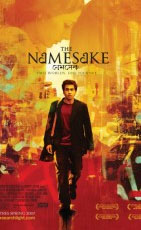
Amazing Grace
Babel
Charlotte's Web
Dream Girls
Into Great Silence
Last King of Scotland
Letters from Iwo Jima
The Namesake
Notes on a Scandal
See
2006 films
I don’t remember the last time I saw a movie in which there is such a strong, loving family without becoming overly sentimental, or reverting to some disaster or horror theme. The Namesake affirms the need for culture and family in order to make the necessary adjustment from childhood to adulthood. The family is not perfect by any means: Ashoki can be distant, and Ashima is overly anxious about her children. Gogol and Sonia want to be American kids like any others, and attempt to cast aside their Indian heritage. Gogol’s struggle with his unusual name (Ashoki names him after the Russian writer) is one of the major themes of the film. As a young man, he takes the nickname, “Nick” rather than Gogol. Eventually, though Gogol and Sonia learn to live in America and maintain that delicate balance between their Indian traditions and the American culture.
No doubt Indian director Mira Nair incorporates her own experiences as she relates the Ganguli family saga in such an authentic fashion. Nothing comes across and false or forced as the family saga unfolds. Location filming and the use of native costumes do much to convey the cultural themes in the story. The Namesake is very relevant in our current world as we struggle with issues of culture, identity and values in our post-modern world, and the continuing debates over immigration. It never comes across as “preachy”. Instead, the messages are found in the story of one particular family and their search across two continents to discover their identity. The love of the Ganguli’s will remain with you long after the movie is over. Tom Condon, OP |
"I don’t remember the last time I saw a movie in which there is such a strong, loving family without becoming overly sentimental..." |
 Home | Contact Us | DLC Dominican Life | USA is sponsored by the Dominican Leadership Conference, the networking organization for elected leaders in the USA. Dominican Life | USA © 2002-2007, All Rights Reserved Web Editor: Anne Lythgoe, OP |
|---|



 There are many scenes which brought tears to my eyes as the Gangulis
deal with the everyday struggles of life, death, family, and relationships: Ashoki
tries to cheer up homesick Ashima, Gogol moves to the city, falls
in love, and ignores his parents, Ashoki leaves Ashima to do a sabbatical
in Ohio. The drama is made of the stuff of life, highlighted
by the cultural differences. My only problem with The Namesake is
its length. It seems long and episodic toward the end, especially
dealing with Gogol’s love life as a young architect in Manhattan. However, The
Namesake ends on a beautiful note, in which Ashima fulfills
one of her life’s dreams, and manages to bridge the gap between
the home of her birth and her new home, in a way that only she can
do.
There are many scenes which brought tears to my eyes as the Gangulis
deal with the everyday struggles of life, death, family, and relationships: Ashoki
tries to cheer up homesick Ashima, Gogol moves to the city, falls
in love, and ignores his parents, Ashoki leaves Ashima to do a sabbatical
in Ohio. The drama is made of the stuff of life, highlighted
by the cultural differences. My only problem with The Namesake is
its length. It seems long and episodic toward the end, especially
dealing with Gogol’s love life as a young architect in Manhattan. However, The
Namesake ends on a beautiful note, in which Ashima fulfills
one of her life’s dreams, and manages to bridge the gap between
the home of her birth and her new home, in a way that only she can
do.